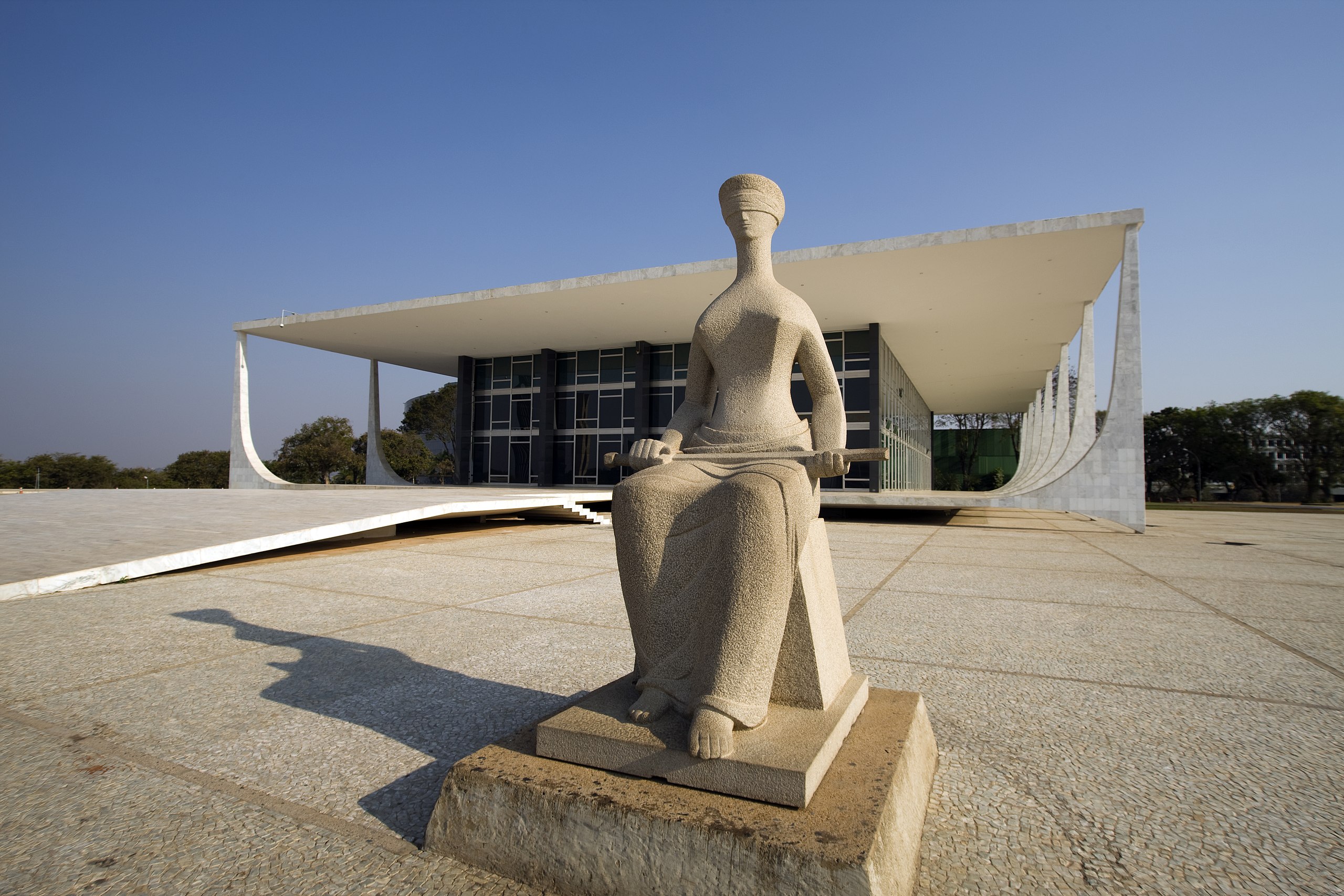
Under the Protection of God: Does the Preamble of the Brazilian Constitution of 1988 Allow Freedom of Expression solely for Christians?
Damião Benilson Gomes de Melo, Rafaela Albuquerque Fires & J. Ernesto Pimentel Filho
Picture of the Supremo Tribunal Federal in Brazil by Dennis W. Asfour (CC BY-SA 4.0).
In Brazil, the constitutional preamble of the 1988 Federal Constitution contains the expression “under the protection of God,” which has sparked debates for many years regarding its legally binding relevance. A landmark decision (the ADI 2076) even addressed whether the expression must be compulsorily reproduced in the preambles of the state constitutions within the Brazilian federation. However, let’s begin with a depiction of Brazilians’ everyday life. The narrative portrays a collision of fundamental rights within an elementary school setting in Brazil.
In any Brazilian institution, whether public or private, there are common-use areas and spaces reserved for teachers, principals, and administrators. These spaces are occupied by education professionals, students, and other staff members who assist with daily maintenance. Each individual brings with them convictions formed through life experiences, and they often customize these spaces, including personal belongings or items related to their religious faith. In theory, the school, as a space for education and instruction, should be a supportive and guiding environment for personal and professional development.
Cultural diversity gave rise to ideological differences and personal conflicts. These authors choose to keep the data anonymous with regard to the characters and location of the events. Given the country’s pervasive controversies and conflicting worldviews, it is common for debates that were once considered easily manageable in the past to now carry significant political implications and actively engage the involved community. What is most evident in reality is the emergence of a conflict that leads to religious intolerance and discrimination. The conflict involved an employee, X, who was devoutly Catholic, hailed from a rural background (the sertão of the famous region of the country, the Nordeste), and was raised by illiterate parents. On the other hand, there was another employee, Y, who openly identified as an atheist. Both peacefully collaborated in the school environment for years and years until one day when employee X brought a personalized calendar featuring the “Sagrado Coração de Maria,” the depiction of the Sacred Heart of Mary, to decorate her workstation. The image was positioned facing the door, providing a privileged view for anyone entering the room, and was placed next to the desk of employee Y, a colleague in the same profession who happened to be absent on that particular day.

The following morning, employee Y was taken aback by the image in the room and initiated a debate regarding the constitutional duty of the secular state, and consequently, of the public school. The heated debate stirred emotions in the environment and quickly evolved into a widespread discussion with the presence of other individuals from the school, as more people arrived that morning and throughout the day. The disagreement gave rise to arguments of religious intolerance, as proponents of other beliefs began to propose that objects representing their religions should also have a place in the school. It didn’t take long for other groups to demand the same visibility and representation in terms of religious articles, in the name of universality and respect for the existence of other “non-Catholic” beliefs in the school setting. This led to comments and speeches of discrimination against African-origin religions, almost pushing the discord to the brink of hostility, escalating towards aggression.
The controversy led to the formation of two different opinions, and they each started building pros and cons in their arguments. On one side were those advocating for the secular nature of the State and the elimination of any form of religious expression. On the other side were those advocating for broad representation of other faiths, designating a space for these alternative beliefs and their liturgical symbols. The impasse was overcome by agreeing to refrain from displaying any religious symbols in the school, including both workstations and public or reserved areas.
The argument for plurality and the right to religious expression was defeated due to unresolved concerns, especially fears of administrative processes or potential intervention from dissatisfied citizens in the State’s Public Prosecutor’s Office, as dissatisfaction had already spread to parents and guardians of the students. As it was a complex and controversial debate, the issue was not properly addressed but rather set aside. Henceforth, the school refrained from the free expression of religious values by its members, given the multiplicity of beliefs among them, including atheists, polytheists, and monotheists. The memory of that controversy lingered. Recently, the discussion was rekindled by a newly hired employee who brought up the decisions of the Brazilian Supreme Court, the Supremo Tribunal Federal, in pronouncements regarding the ADI 2076, the ADPF 24, and the ADI 4439.
The controversy revolves around the legal relevance of the preamble of the 1988 Federal Constitution. One interpretation, led by Justice Carlos Velloso, views the preamble as a mere introduction without normative force. However, Justice Carmen Lúcia’s position in the ADI 2649 sees the preamble as representing the political will and fundamental values guiding the interpretation of the Constitution. This evolving interpretation emphasizes the preamble’s significance in understanding the 1988 Constitution’s text. In the ADPF 24, the Brazilian Supreme Federal Court analyzed the possibility of abortion interruption in cases of anencephaly with the aim of decriminalization. The court addressed the issue of a secular state, clarifying that secularism should not be confused with laicism. It highlighted that secularism was established as a constitutional principle for the first time in the Constitution of the United States of Brazil in 1891. Brazilian politicians and high Army authorities, out of reverence and deference to jurist Rui Barbosa, somewhat bizarrely mirrored aspects of the American constitution in Brazil’s political and legal fabric.
Therefore, the principles of a secular state have been constitutionally upheld for over a century, evident in all Brazilian Constitutions since 1891. The process of educational secularization in Brazil was even acknowledged by the king, as may be seen in Dom Pedro II’s writings. In 1862, he emphasized that “education must be secular, except for religious aspects.” This stance represented a crucial milestone for the separation between church and state, enshrined in Article 72, §6, of the 1891 Constitution, which explicitly stated that “Education in public establishments shall be secular.” The secular origin in constitutional history, however, began with the U.S. Constitution of 1787. It lacked any ties between the state and church, and the First Amendment in 1791 ensured religious freedom while prohibiting an official state religion. Since then, numerous republican constitutions, including those of France, Turkey, Mexico, India, and Brazil, have followed the same tradition.
While examining the ADI 4439, which addressed religious education in public schools and equal treatment for all religious denominations, Justice Roberto Barroso, the case’s rapporteur, presented, among other arguments, the challenge of implementing a neutral and secular education on religions in all public schools for children in Brazil or any other part of the world, as such teaching often leads to religious indoctrination. The Brazilian Constitution’s preamble sets forth the values and objectives for education, expressing the will of the people and the constitution makers who enacted it. We normally find legal theories regarding the legal relevance of the preamble classified into three categories: (1) theory of legal irrelevance, (2) theory of indirect legal relevance, and (3) theory of full efficacy.
The legal irrelevance theory views the preamble as symbolic, having no direct legal effectiveness, being limited to the constitutional provisions themselves.
Some scholars argue that it serves as a mere declaration of principles, lacking specific legal consequences, considered a political expression of the constituent. One example of this reasoning is the ADI 2076. The reference to God in the preamble of the Brazilian Constitution is not a binding element. Although it recognizes a religious sentiment and reflects a cultural aspect of Brazilian society, it does not carry any legal implications or consequences. The inclusion of this reference does not create legal obligations, rights, or duties related to religion, and it does not impose any particular religious beliefs on the citizens or institutions of Brazil. It can be seen as a political and cultural expression rather than a legally enforceable provision.
Conversely, the indirect legal relevance theory advocates a broader interpretation of the preamble, attributing legal significance and normative effects. It can be viewed as an interpretative key to the Brazilian Constitution, providing principles and values that aid in understanding the scope of constitutional norms, as seen in the ADI 2649. Under this perspective, it serves as a constitutional hermeneutic element, influencing the interpretation and application of other constitutional provisions, reflecting the intentions and objectives of the constitutional legislator, resolving potential conflicts or ambiguities in the text. Finally, the theory of full efficacy asserts that the preamble carries normative weight and can serve as a legal basis for interpreting and applying constitutional norms. Advocates argue that it articulates society’s highest values, providing guidance for interpreting and applying constitutional provisions. According to this perspective, the preamble holds constitutional significance and should be considered a source of legal rights and obligations. The divergence regarding the constitutional preamble in Brazil is not solely doctrinal, as there is also jurisprudential disagreement concerning the legal relevance of the preamble, reflecting different conceptions of constitutional interpretation and the perception of the historical context and political and social values present in the Constitution’s formulation.
In the ADI 4439, Justice Alexandre de Moraes argued from the standpoint of the preamble as a norm with full legal effects that it was not permissible to “artificially promote its own religious teaching, with a specific state-imposed content for the subject” taught in schools. As a result, the dissenting opinion prevailed over the opinion of the rapporteur, Justice Roberto Barroso, who asserted that the instructor of religious education had to be neutral. It was the preamble that supported the rejection of unconstitutionality for the norms under consideration in the Supreme Court of Brazil. Moraes stated that school subjects must be “taught in accordance with the principles of their [students’] religious affiliation and based on the tenets of faith.” Secularism ensures that the activity is optional, but it does not transform religious education into a history or philosophy content. There is “constitutionality of confessional religious education.”
In ADI 4277, Justice Ayres Britto relied upon the principles and values outlined in the preamble of the Constitution to underpin his decision, indicating that therein lies an inseparable element in the pursuit of a just and compassionate society. The Brazilian Supreme Court has been increasingly relying on and justifying its rulings based on the constitutional preamble. This approach does not view the preamble as inferior to other parts of the constitution.
After the end of the dictatorship in 1988, Brazil promulgated its current Federal Constitution. Its preamble expresses the fundamental principles of a democratic rule of law. It states that the constitution is made “under the protection of God,” highlighting the secular nature of the State, and establishes the commitment to build a free, just, and solidary society, ensuring national development, eradicating poverty, and promoting the welfare of all. The preamble reflects the democratic and inclusive values historically enshrined in the 1988 Constitution, which have legal efficacy in the other provisions and at the core of the national legal system.
It is the responsibility of the Judiciary to interpret the preamble and other constitutional norms to guarantee fundamental principles such as equality and religious freedom. The Judiciary must ensure that the religious mention in the preamble is not used to impose a religion or violate the individual and collective rights of citizens. According to the 1988 Federal Constitution (Art. 5, Inciso VIII): “No one shall be deprived of rights due to religious belief or philosophical or political conviction, except in cases of legal obligations imposed on all and the refusal to fulfill alternative service, as established by law.”
The relationship between religion and the constitutional preamble is complex and might vary among countries, but the inclusion of religious references in Brazil’s preamble can be interpreted either as a recognition of the spiritual dimension in society or as a historical dimension. It is essential that this relationship be balanced, respecting the constitutional principles of religious freedom and the secular nature of the State. The constitutional reference to God continues to spark debate and dissent, both in schools and among legal scholars in legal literature and among the Justices of the Brazilian Supreme Court.♦

Damião Benilson Gomes de Melo is a Ph.D. candidate in the Graduate Program in Legal Sciences at the Federal University of Paraíba (UFPB). Benilson has a Bachelor’s degree in Law.

Rafaela Albuquerque Fires is a special student in the Master’s course at the Graduate Program in Legal Sciences at the Federal University of Paraíba (UFPB). Rafaela has a Bachelor’s degree in Law.

J. Ernesto Pimentel Filho is a Professor of Legal History and Economic History and permanent faculty member of the Graduate Program in Legal Sciences and in the Department of History at the Federal University of Paraíba (UFPB).
Recommended Citation
Gomes de Melo, Damião Benilson, Rafaela Albuquerque Fires & J. Ernesto Pimentel Filho. “Under the Protection of God: Does the Preamble of the Brazilian Constitution of 1988 Allow Freedom of Expression solely for Christians?” Canopy Forum, September 8, 2023. https://canopyforum.org/2023/09/08/under-the-protection-of-god-does-the-preamble-of-the-brazilian-constitution-of-1988-allow-freedom-of-expression-solely-for-christians/.

